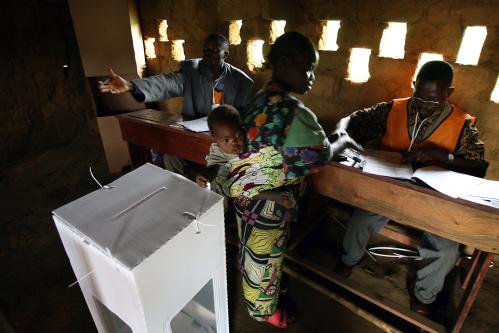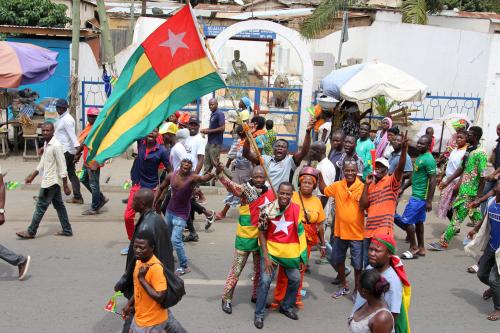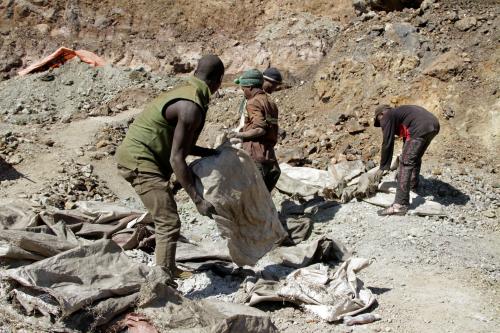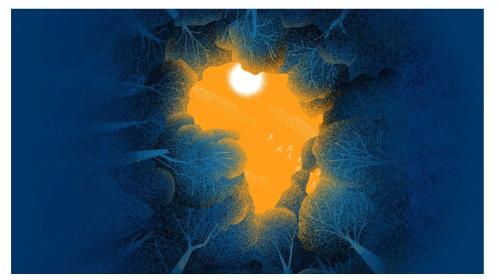Ramaphosa focuses on domestic and regional challenges as South Africans protest over minimum wage
On Wednesday, the South African Federation of Trade Unions (SAFTU)—which represents 30 unions with around 800,000 members—organized marches in six South African cities with thousands of participants protesting the government’s proposed minimum wage legislation. The current minimum wage proposal, which was approved by the cabinet in November 2017, calls for a 20 rand (R) ($1.60) an hour minimum wage. President Cyril Ramaphosa has argued that the current proposal will help reduce wage inequality. However, his spokesperson, Khusela Diko, has stated, “The president recognizes that the national minimum wage is not a living wage, but we need to start somewhere.”
Although the R20 minimum wage was meant to be introduced on May 1, 2018, a parliamentary committee recently sent the bill back to the labor ministry for re-drafting. Wednesday’s protesters called the current proposal “an insult” and “starvation wages,” arguing that the minimum wage be raised to R12,500 a month—nearly triple the proposed R20 hourly wage in monthly terms. Proponents of the current proposal, however, argue that raising the wage to a significantly higher level could lead to higher unemployment, as employers would cut jobs in order to meet the higher wage requirements. On Thursday, Ramaphosa met with officials from the labor ministry to discuss the wage policy and timeline for its introduction. A labor ministry spokesperson, Teboho Thejane, stated that officials are still working to finalize the minimum wage legislation with lawmakers by August.
In addition to dealing with domestic issues this week, in other news, Ramaphosa served as chairperson of the Southern African Development Community (SADC) summit in Luanda, Angola on Tuesday. The summit, which brought together SADC member countries’ heads of state and government, centered on examining progress toward democracy and security within the community, especially in Lesotho, the Democratic Republic of the Congo (DRC), Madagascar, and Zimbabwe. Notably, Ramaphosa was hopeful for the future of democracy in the DRC, stating that President Joseph Kabila’s attendance at the SADC summit and assurances that preparations are on track for presidential elections on December 23, 2018, marked a positive development.
Political protests erupt in Madagascar
Thousands of people flooded the streets of the Malagasy capital of Antananarivo on Monday in protest of new election laws and the recent deaths of anti-government demonstrators. Just two days before, the recent victims had been a part of about 1,000 protesters who had gathered to oppose the new laws that they say will prevent opposition candidates from running. The activists also object to new provisions regarding campaign financing and media access. In response to Saturday’s events, President Hery Rajaonarimampianina harshly rebuked the demonstrators, stating, “What happened on Saturday is a coup,” and warning “those who sow unrest and incite people to tear each other apart that the state will assume the responsibilities that correspond to these actions.”
Scheduled to hold elections later this year, Madagascar is experiencing heightened political tension: Rajaonarimampianina has not yet announced if he will seek re-election, but bids for the presidency are already being made by former and controversial Presidents Marc Ravalomanana and Andry Rajoelina. Ravalomanana became president in 2002 after a disputed election and was replaced by Rajoelina in a 2009 coup. Many of their supporters have joined the current demonstrations.
Sudan continues to deal with fuel crisis
In recent weeks, Sudan’s dollar crisis has been devolving into a fuel crisis. The currency crisis started earlier this year when the Sudanese pound hit a record low of 40 pounds to the dollar on the black market. This development has led the central bank to devaluate its currency twice since the start of 2018. Sudan has experienced macroeconomic troubles since 2011, when the country lost three-fourths of its oil supply as South Sudan seceded.
The shortage of foreign currency has curtailed the government’s efforts to pay for its imports, which has, in turn, prompted a fuel crisis. Vehicles were stuck in long lines at gas stations in the country’s capital this week. In addition, the fuel crisis has led to an increase in transportation tariffs. Moreover, the crisis has been notably harmful for the agricultural sector: Many farms have ceased operating since they can no longer run their mills and water pumps, which is also triggering a shortage of drinking water. In certain parts of the country, the crisis has delayed the traditional April 15 start of the agricultural season. The agricultural crisis is increasing the price of vegetables; in the agricultural state of El Gedaref, local residents have seen a four-fold increase in prices since the crisis started.
AGOA and MCA Modernization Act is signed
After passing its penultimate hurdle in the U.S. Senate earlier this month, the AGOA and MCA Modernization Act was signed into law on Monday, April 23. The new law aims to advance trade promotion in Africa and important regional and cross-border investments through the efforts of the Africa Growth and Opportunity Act and the Millennium Challenge Corporation.







Commentary
Africa in the news: Minimum wage in South Africa, protests in Madagascar, and fuel crisis in Sudan
April 27, 2018